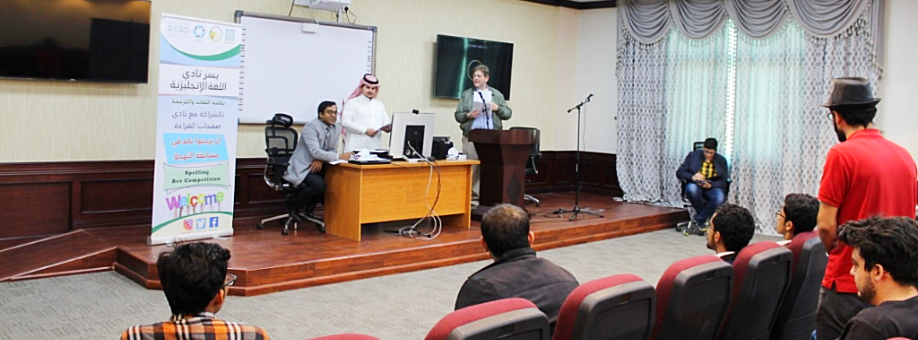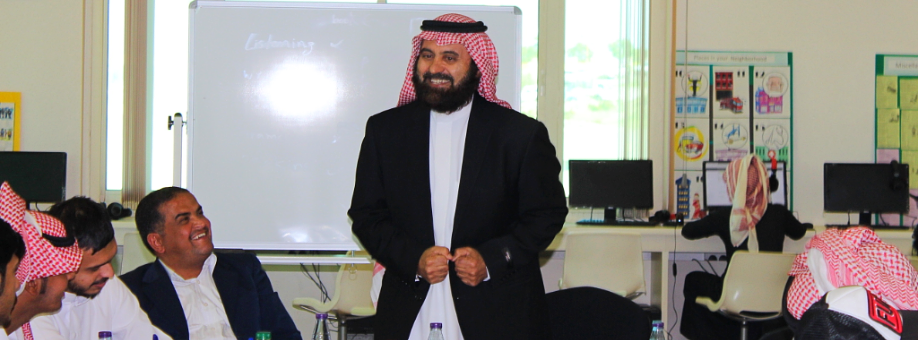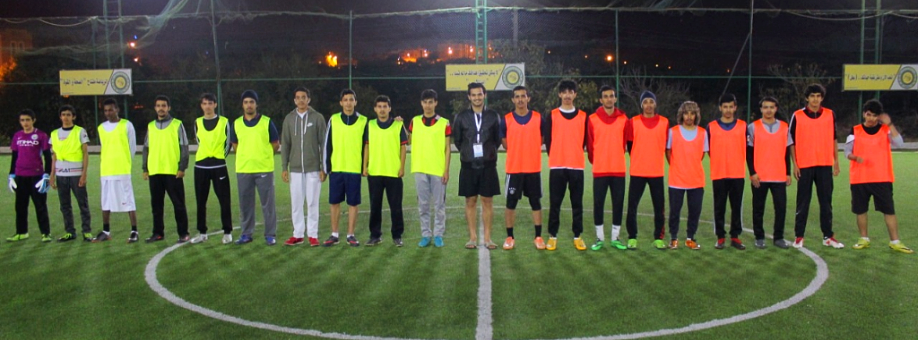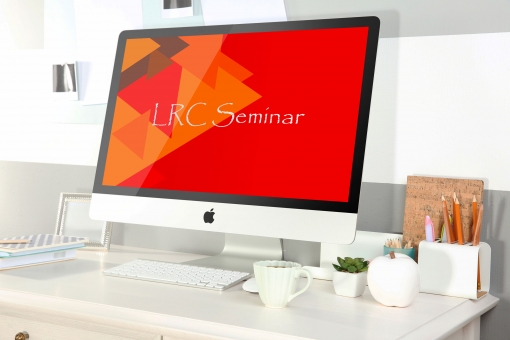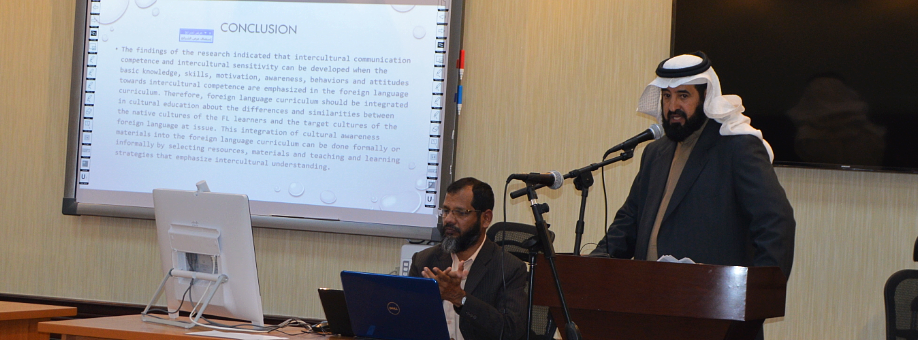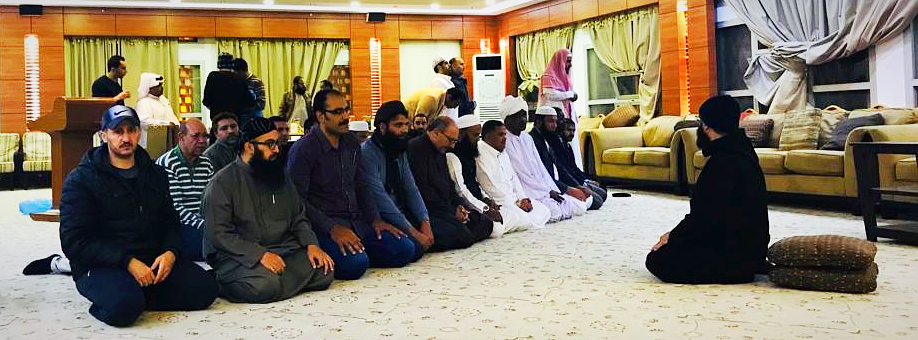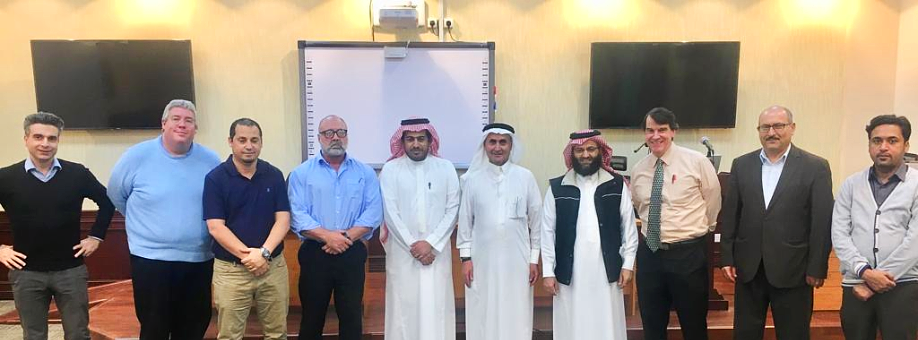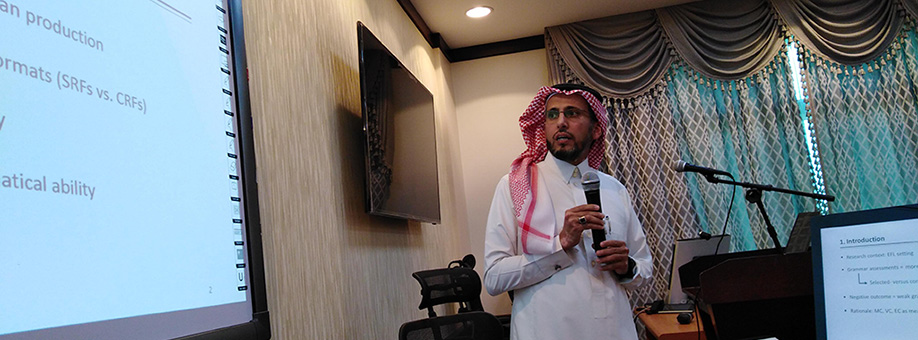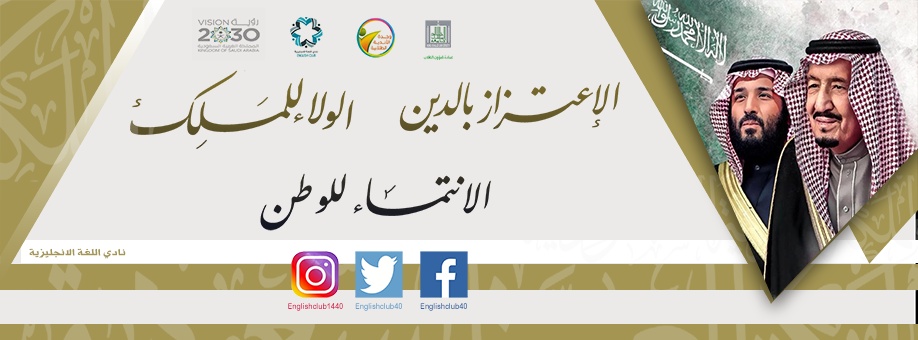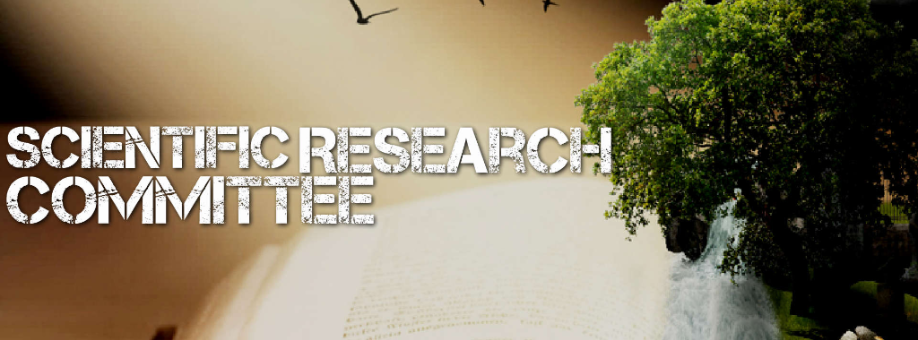News
On November 25, 2018, the English Club in collaboration with the Reading Club held the Annual Spelling Bee Competition. More than 20 students representing various levels, colleges, and countries participated. The event required an intense amount of preparation by both the organizers and the participants. The vocabulary was derived from a rather lengthy fictional story that was provided in advance.
The event was highly competitive and this was reflected by the charged atmosphere in the room. The spelling bee involved three full rounds of elimination, all of which came down to 1 or 2 points between and among competitors. The event lasted nearly 3 hours and involved hundreds of vocabulary words. Event Judge, Mahmudul Haque, managed to keep order in often spirited and contentious competition. Director of the English Club, Khalid Al-Qasemi, said: 'I am so pleased with the large turnout and the seriousness with which the participants approached this event'.
The event featured cash prizes. First place went to Mohammed Al-Yami, a level 1 FLT student. Second place went to Firas Al-Hajj, an engineering student. Third place went to Mohammed Ahmed, a university student.
Event Wordsmith, Dr. Charles Forman, congratulated all of the competitors, noting 'While we all appreciate the competitive spirit of this competition, the participants achieved an even greater objective than bragging rights and monetary prizes – they all learned a great deal from the experience'.
Date: 11-29-18
Source: Faculty of Languages and Translation
On Tuesday the 6th of November, students of the Faculty of Languages and Translation attended a seminar organized by the Intellectual Awareness Unit at the Faculty of Humanities. Dr. Lamya Al-Qadi delivered a seminar on the impact of globalization on social values and the role of educational institutions in safeguarding intellectual security. "There are advantages and disadvantages to using technology, especially social media. There are those on the internet who spread misleading or false information that can undermine our values and traditions. We must care to preserve and defend our values and traditions," said Dr. Al-Qadi. As such, she explained, 'Intellectual Security' must be a top priority to help protect our society. Maintaining same enhances the feeling of stability and cohesiveness within our community.
The seminar was graced by Intellectual Awareness Unit Vice Supervisor, Dr. Dawlah Mohammed Mané, and the FLT’s Intellectual Awareness Unit coordinator. 16 students participated in the discussion. The meeting highlighted the significance of 'Intellectual Security' and stressed the importance of stability and social values.
Date: 15/11/2018
Source: Ms. Amal Abdelsattar Metwally, Scientific Research Committee Coordinator
On November 5th, the Women's Scientific Research Committee of the Faculty of Languages and Translation held a two-hour workshop titled "Reach Your Goal With IELTS". It was led by lecturer Ms. Anjum Misho. She began with an overview of the International English Language Testing System (IELTS). IELTS, she explained, is the premier English language proficiency test and is recognized worldwide for admission to education and employment opportunities. She then conducted a brief session concerning the IELTS testing process and assessment parameters.
Thereafter, Ms. Misho held an intensive session concerning IELTS preparation. She focused on the Academic module, which is the test most used by students applying for higher education or professional registration in an English speaking environment. This module is especially important to those seeking graduate, post-graduate, or professional training. Each program participant received a variety of materials, which will be helpful in preparing for the 4-testing components (listening/reading/writing/speaking skills).
The workshop was attended by 25 undergraduate, graduate, and former students. From the numerous questions posed by the attendees, it was apparent that many were very eager to master the test. Ms. Misho provided a great deal of useful information on methods to prepare for and do well on the IELTS test.
Towards the end of the workshop, the scientific research committee coordinator gave special thanks to Ms. Amjad Khazim Alamri and Ms. Ahlam Ahmad Asiri. The coordinator also recognized the participants for their attention and diligence. Certificates of participation were then distributed to the grateful participants.
Date: 15/11/2018
Source: Ms. Amal Abdelsattar Metwally, Scientific Research Committee Coordinator
Associate Professor Michael Hadzantonis conducted a workshop on Frame Theory and Footing in Linguistic Anthropological Analysis, which was organized by the Language Research Center of King Khalid University, on November 14, 2018. He provided an in-depth explanation of ‘Footing and Framing Theory,’ a theory based on the ways in which discourse is contextually deconstructed and anthropologized.
AP Hadzantonis, while highlighting the history of this theory, discussed Erving Goffman, who pioneered micro-sociology, who evidenced social constructions of the self, and who subsequently developed concepts of framing and frame analysis. While including mention of Volosinov (1929; 1973), Hadzantonis substantiated the shortcomings of the study of language structures, and hence one that rigidly overlooks context and is therefore isolated from social life. To remedy for this, he added, is to emphasize reported speech, as its structures expose active relations between messages.
AP Hadzantonis emphasized the pragmatic applications of Footing and Framing. An effective application of this, he suggested, exposes multi-party sequences of talk of different participants and evidence actions of hearers and multi-party interactive organization of utterances. It also models analyses of types of speakers coexisting within speech. He finally demonstrated a diagrammatic model of a participation framework.
The Part 1 session was informative, interactive, and thought-provoking, and leads into the forthcoming Part 2.
Date: 11/14/2018
Source: Mohammad Adil Siddique
Multimedia Source: Mohammed Jabir
On November 12th, there was a gathering of the English Club in the Language Enhancement Program (LEP) room at the main campus. The purpose of the meeting was to conduct another installment of the “Linguistics Hour”. The Linguistics Hour is a continuing project to identify issues in English language learning, discuss methods for improving English language education, and to identify practical applications for the usage of English in the Kingdom of Saudi Arabia.
At the commencement of the Linguistics Hour, there were two roundtable discussions each led by LEP staff members. First, Dr. Hasan Jaashan discussed a variety of topics related to applied linguistics and language acquisition. Then, Saqub Aftab shared information about a language study. This study concluded inter alia that young children possess the ability to learn multiple languages at a near-native level proficiency.
The featured speaker at the Linguistics Hour was Prof. Abdallah Hady Al-Kahtany. Prof. Al-Kahtany is a highly-respected educator of the English language. He also served as the Dean of Faculty Affairs. This gives him a broad and deep understanding of the issues surrounding foreign language education.
Prof. Al-Kahtany began by inquiring of the student participants how they were drawn to studying English at the university level. There was a wide variety of interesting responses. One student said he became interested in the language when he rode with his father who was a driver for foreigners who spoke English. Prof. Al-Kahtany cautioned the students that their studies should revolve around more than future employment prospects. He emphasized that studying language should be an effort driven by internal curiosity and desire.
Prof. Al-Kahtany noted the potential benefits of being multilingual. He explained that knowing several languages expands ones worldview and gives a deeper understanding of cultures and international issues. In addition, being able to communicate in the native languages of other countries is an ideal way of spreading the message of Islam throughout the world. Multilingual communication also presents the Kingdom of Saudi Arabia in a positive light.
Then, Prof. Al-Kahtany admonished the students to make learning a lifelong ambition. He noted that the more one reads, the more one learns. Learning, for its own sake, is a noble and valuable cause he concluded.
At the end of the Linguistics Hour, Prof. Al-Kahtany thanked all of the students and staff who participated, noting that the LEP is a valuable resource to our students. Director of Student Activities, Khalid Al-Qasemi, thanked on behalf of the English Club, all of the faculty who participated and mentioned he looked forward to more Linguistics Hour Programs.
Date: 11/13/2018
Source: Faculty of Languages and Translation
Multimedia Source: Nasser Ali
On the 7th of November spectators who had braved the cold winter's night to attend the highly anticipated 2018 Football Final of the English Club, were treated to an extremely thrilling battle between two highly energized teams. After leading Juventus for most of the match, Manchester City ceded a goal in the last minute of this, truly exhilarating, encounter. Juventus thus narrowly managed to edge out City 6-5, to win the coveted winner's trophy. It was interesting to note that the majority of the spectators felt that a draw would have been a much fairer reflection of the game. But, in sport, the results are often not an accurate reflection of the entire game.
Medals, trophies, and prizes were awarded to the winners by Vice Dean, Dr. Yahya Asiri, and Chairman, Dr. Munassir Alhamami. They expressed their gratefulness to Director of Student Affairs, Khalid Al-Qasemi, and the managing committee of the English Club for their hard work which ensured its success. They also indicated that they were hopeful more of the faculty's staff would support similar future events.
Date: 11/8/2018
Source: Azaad Hayat
On the 7th of November, Dr. Mazeegha Al-Tale’ delivered a presentation titled “PECAL Model: Bringing the Best Together for Dynamic Gains” at a Language Research Center seminar.
Dr. Al-Tale’ started her presentation by identifying the objective of her research – having the university produce competent, skillful, and productive members of society. She then reviewed the working model designed to effectuate these noble objectives. As she explained, the model focuses on effective EFL teaching of university students to the workplace.
Dr. Al-Tale’ explained that PECAL stands for “Psychological Electronic Cooperative Active Learning”. She further explained that she applied this model to her Applied Linguistics 2 course at the Faculty of Languages and Translation. This course focuses on identifying and evaluating various teaching methods. Her research involved 10 university employees, 83 female undergraduate students, and 20 diploma program students. Dr. Al-Tale’ compared the academic performance of the experimental group with the control group. She prepared a differential analysis citing several factors in relation to learner attitudes.
Dr. Al-Tale’ observed that the research participants responded favorably to lectures using the PECAL Model. She also noted that as the students were more successful, the teachers responded positively as well. This made for a generally more effective educational environment benefitting the students, teachers, and staff. Dr. Al-Tale’ noted that the model could be replicated and implemented in academic environments. This can create synergies that ensure long-term workplace effectiveness and continuously improving efficiencies.
A lively Q&A session ensued among the participants concerning how the presenter’s theoretical model was developed. In her response, Dr. Al-Tale’ clarified and embedded her take away ideas to make them more relevant to the audience. Overall, the seminar was a good opportunity for attendees to deepen their understanding of the PECAL Model.
Date: 11/8/2018
Source: Mohammad Adil Siddique
The Women's English Club of the Faculty of Languages and Translation held a program titled "Above the Sky" on Sunday the 28th of October from 10 a.m. to 11 a.m.
The purpose of the program was to publicize the role of women with respect to Vision 2030. In one of his seminal speeches, Crown Prince, HRH Mohammed bin Salman, noted that women play a key role in reshaping the Saudi Arabian economy as part of Vision 2030. In this program at KKU, the participants expressed their gratitude for HRH Crown Prince Mohammed bin Salman’s confidence in making sure that women play an important part in the Kingdom’s national strategy. The women participating in the program are highly enthusiastic and are looking forward to reaping the benefits of a highly modernized economy which will provide many opportunities for women, youth, and the public-at-large.
Then, the 1st place winning team of the Hajj Hackathon “Turjuman” participated by presenting a video that summarizes the factors that helped them to win the Hajj Hackathon. As explained on the website TechRadar, "Hackathons are ways to pool human resources with the purpose of tackling difficult challenges and coming up with solutions by producing usable software. By having multiple teams with diverse backgrounds competing, the organizers get access to a range of high-quality potential solutions."
The Turjuman’s team prize-winning project was based on the installation of QR codes on all Hajj signage showing the translated versions of each sign in the user’s native language.
At the end of the program, the team conducted a question and answer session in which they addressed the details of the steps they took to win the Hajj Hackathon, the largest event of its kind in the Middle East.
Date: 11/4/2018
Source: Asma Al-Ahmari, Women's Campus IT Ambassador
Multimedia Course: Hind Mohammed Maghram
The Women’s English Club at the Faculty of Languages and Translation organized a visit to Gold's Gym to hold an awareness campaign about breast cancer on Sunday the 28th of October. Students of the English Club designed and prepared blouses and gifts that will help to raise awareness of breast cancer and other women’s health concerns. During the three-hour visit, the students showed their unity by all wearing the same blouse designed for this campaign. Later, they attended a Zumba fitness class, which is an excellent form of exercise for women of all ages. There was a question and answer session with a highly qualified women’s health trainer who provided useful information on proper diet and exercise as part of a healthy lifestyle. At the end of the visit, the trainers were given certificates of appreciation to thank them for their hospitality and their participation in the event.
Date: 11/3/2018
Source: Faculty of Languages and Translation
The Women’s Scientific Research Committee at the Faculty of Languages and Translation held a seminar on October 29th titled "What Does It Mean to Have Programmatic Accreditation." The seminar was led by Dr. Eman Alzaanin, supervisor of the Academic Development and Quality Unit. The program began with a discussion on the university’s relative strengths and weaknesses with respect to the accreditation process in the Faculty of Languages and Translation. The accrediting body for most universities in the Kingdom of Saudi Arabia is the NCAAA. "The organization examines and evaluates various educational programs to ensure that institutions are meeting the standards set by internationally recognized experts in their field," said Dr. Alzaanin. The seminar was attended by Assistant Dean, Dr. Suaad Al-Qahtani, and Vice Dean, Dr. Salma Al-Qahtani, along with a number of assistant professors and lecturers of the Department of English.
Following the opening remarks, there was a review of the reasons that the faculty should seek accreditation and a brief summary of the accreditation process. Dr. Alzaanin explained many of the standards the university is required to meet in order to receive accreditation. They include but are not limited:
Mission and Objectives;
Program Administration and Quality Assurance;
Learning Resources, Facilities, and Equipment.
Towards the end of the seminar, there was a question and answer session regarding the faculty’s readiness to demonstrate that the program substantially meets the quality standards and other requirements for accreditation.
Date: 11/3/2018
Source: Amal Metwally - Scientific Research Committee Coordinator
Prof. Hamad Al Dosari delivered a presentation titled Developing and Assessing the Relationship between Intercultural Communication Competence and Intercultural Sensitivity in the EFL Classroom at a Language Research Center seminar held on October 31, 2018. His presentation is about a paper he is going to present at the 24th Annual International Conference of the Bolivian English Teachers Association.
Prof. Dosari first explained Communicative Competence in detail. He emphasized that it involves intercultural competence and intercultural sensitivity. Learning should include verbal communication such as conversational styles in addition to nonverbal communication such as gestures and body language which is behavior that adds to spoken or written language, said Prof. Dosari while quoting Arévalo-Guerrero. Some researchers, he added, suggested that "intercultural competence, intercultural communicative competence, intercultural sensitivity, and cross-culture adaptation" can be used interchangeably. In his study, he used two instruments – the Intercultural Communication Competence Survey by Aldosari & Mekheimer (2018) and the Intercultural Sensitivity Scale (ISS) of Chen and Starosta (2000).
Prof. Dosari, based on his research findings, concluded that intercultural communication competence and intercultural sensitivity could be achieved when the basic knowledge, skills, motivation, awareness, behaviors, and attitudes towards intercultural competence are focused on in the foreign language curriculum. He emphasized that foreign language curriculum should be integrated into cultural education that would show differences and similarities between the native cultures of the FL learners and the target cultures of the foreign language.
The seminar was an overall success.
Date: 11/1/2018
Source: Mohammad Adil Siddique
Multimedia Source: Mohammed Jabir
The students of the Faculty of Languages and Translation attended a seminar organized by the Intellectual Awareness Unit on Tuesday, October 30th in the Science College Theatre. The presentation was about the significance of the feeling of appreciation and belongingness to one’s home country. Dr. Aisha Abu Sab’a, assistant professor at the Faculty of Islamic Legislation, started her presentation with a review of a map of the prophets’ journeys. She referred to the journey of Prophet Ibrahim (peace be upon him) away from his home country. She referred also to Prophet Musa's (peace be upon him) journey away from his home country by explaining that the people of that city were planning to kill Musa (peace be upon him), and so he was told to flee, and he did. Allah says, "So he left it, fearful and anticipating [apprehension]. He said, “My Lord, save me from the wrongdoing people" [28:21].
"Your home country is the place where you live, settled, and to which you belong whether you were born there or not", said Dr. Abu Sab’a. She indicated the significance of one’s feeling of love and belongingness to one’s home country. In the Qur'an, it is stated: “If We had ordered them to sacrifice their lives or to leave their homes, very few of them would have done it” [4:66]. She concluded this part by referring to the greatest model of this when she referred to Prophet Muhammad (peace be upon him) and his deep love for Mecca and his great love to Al-Madinah after he settled there and it became his home. She further emphasized the grace of feeling belongingness to one’s home as she referred to the Messenger of Allah's (peace be upon him) prophetic tradition: "Whosoever begins the day feeling family security and good health; and possessing provision for his day is as though he possessed the whole world".
Dr. Abu Sab’a, indicated that we all should have this feeling of belongingness to our home country. "We should acknowledge and appreciate the efforts of the Kingdom of Saudi Arabia as well as His Royal Majesty the King and His Royal Highness the Crown Prince", she asserted.
The event was attended by the Vice Supervisor of the Intellectual Awareness Unit, Dr. Dawlah Mohammad Mane. Students from various faculties along with 28 students from the Faculty of Languages and Translation participated in the event. The meeting enriched students’ knowledge and increased their awareness of appreciation, gratitude, and belongingness to their home country.
Date: 10-30-2018
Source: Ms. Amal Metwally, Coordinator of Intellectual Awareness Unit
The delicious aroma of savory spices curling up from the grill and wafting through the air set the stage for the Faculty of Languages and Translation’s semesterly social gathering during the 1439-1440 academic year. Nearly 50 faculty members and administrative staff gathered together and got to know each other in an informal setting. Conversations about academic work, research, career paths, and general interests filled the night.
"The social gathering was a great way for everyone to share experiences and stories over hot drinks and appetizers. We do our best to create a family-like feeling where we are in it together and need to help one another. This was a great night to come together indoors while it is raining. Rain is considered a miracle in our culture and Abha will very different over the next few days," said Dean Abdullah Al-Melhi.
Dean Al-Melhi encouraged more events of this nature in the future, adding that the informal group dynamic not only creates lasting memories with colleagues, but also facilitates interaction outside of established circles.
Date:10/29/2018
Source: Faculty of Languages and Translation
Multimedia Source: Mohammad Taisir
The Faculty of Languages & Translation organized a meeting with new faculty members on Wednesday, October 24, 2018, at 12:00 pm in Room A/3/60.
Dean Abdullah Al-Melhi welcomed all the new faculty members and spoke about the central role that they will have in the faculty. He went on to express his vision of the college as like a family of trusted colleagues that value each other as both competent professionals and as friends, who help and support each other every day.
Dr. Yahya Asiri, Vice-Dean, Faculty of Languages & Translation, gave a detailed presentation explaining the rules, regulations, as well as the academic and administrative structure of the college and the university. Dr. Asiri highlighted the academic responsibilities of the faculty members. He also introduced the new faculty members to the Saudi culture.
At the end, there was a Q/A session. Questions related to the English Department were answered by Dr. Munassir Alhamami, English Department Chair; research and e-learning issues were addressed by Dr. Ismail Al-Refaii, Language Research Center Director, and Mr. Mohsin Khan, E-Learning Unit Supervisor, respectively.
Date: 10-26-2018
Source: Mohsin Khan
Dr. Mohammad Shuaib Asiri delivered a presentation titled Comparing Multiple Choice, Verb Conjugation, and Error Correction in Grammar Assessment at a Language Research Center seminar held on October 24, 2018. His presentation was about his research in grammar assessment.
Dr. Asiri first compared selected-response tasks with constructed task formats. He identified the negative outcomes of the former. In his research, he said, he had chosen three types of tasks used in grammar assessment: Multiple choice, verb conjugation, and error correction. His research questions were about task formats’ correlation with the measurement of grammatical ability, performance on task formats relationship with strategy use and their correlation with the elicitation of answer explanation. Dr. Asiri conducted his research on 106 intermediate-level students. He explained in detail the findings of his research questions.
Dr. Asiri concluded that multiple choice tasks differ significantly from verb conjugation and error correction tasks in measuring grammatical ability in terms of whether they reflect learners’ ability to recognize a rule or produce something on their own. The use of strategies, he added, varies across three tasks mentioned above in terms of test management and test-wiseness. There is a positive correlation, he said, between the difficulty involved in tasks and answer explanation. He recommended there be more constructed tasks than selected-response ones so that proper learning takes place, and task formats, he emphasized, must be incorporated with language skills.
The seminar was very interactive and an overall success.
Date: 10/24/2018
Source: Mohammad Adil Siddique
The Deanship of Student Affairs organized a visit to Eva's Art Event for students of the Faculty of Languages and Translation on Sunday, October 7th. They were introduced to artwork on display and learned about the support that this event provides to young and talented artists. The aim was to create awareness of art through a fun, exciting and hands-on learning environment.
An art gallery containing over 100 pieces of local artists headlined the event. In addition, the photography section displayed numerous photos that evoked strong emotions. The event ended with a group discussion among the students and artists of the event.
Date: 10/22/2018
Source: FLT Female Campus
The English Club at the Faculty of Languages and Translation, Female Campus, and the Area 39 Asir Female Toastmasters Club organized a program entitled قيادتي لذاتي on the 10th of October 2018.
It was held in the Science College Theater from 10 to 12 o'clock. The assistant dean attended the event with some of the faculty members and students of the English department.
The program included an explanation on how to become a member of Toastmasters International and the supportive learn-by-doing environment that it provides. Afterward, five speeches delivered by students in English and Arabic wowed the audience. At the end of the event, certificates were given to the members of the Toastmasters club who prepared this event.
Date: 10/10/2018
Source: FLT Female Campus
The Female Campus Scientific Research Committee at the Faculty of Languages & Translation organized a program titled 'Exploring the World of Fiction' on October 17, 2018. It was the first program of the Scientific Research Committee for the 2018-19 Academic Year for students of all levels.
In this program, upper-level students Ms. Abeer Abdulrahman Al-Asmary and Ms. Lama Hussein Saed Al-Shahrani introduced students to the world of literature. At first, they shared their experiences of exploring the world of fiction, and then the advantages/benefits of reading literary texts were highlighted. Additionally, visuals on the masterpieces of famous authors were displayed along with movies that are based on famous novels. This program aimed to encourage all the students - who are not yet familiar with English Literature - to familiarize themselves with the field from the very beginning of their academic career. It was emphasized that when learning the English language, reading will increase their receptive understanding of new items and it will stimulate the productive use of the target language. By reading a familiar genre in English literature like fiction, students were informed that it would help them improve their communication skills and learn from a new text.
English Department Supervisor, Ms. Safiah Ali Asiri, presided over the program. Faculty members and students who attended this program were an inspiration to the presenters who enthusiastically conducted the program.
Date: 10/17/2018
Correspondent: Ms. Shanjida Halim, Scientific Research Committee Member
The English Club at the Women's College of the Faculty of Languages and Translation held the 88th Saudi National Day celebration on the 26th of September under the supervision of Ms. Norah Alqahtani. The club helped to decorate the venue and kicked off the celebrations which started with the national anthem. The anthem was followed by a stirring recitation of the Holy Quran.
After a welcoming speech presented by the students, Dr. Khlood Abu Melha gave her speech. A video titled “Saudi Arabia in the Eyes of Others” prepared by the Faculty of Languages and Translations was presented.
The English Club also prepared a corner of the different cultures in Saudi Arabia and different meals and souvenirs from different parts of the country. Pictures of the martyred soldiers were shown to honor them on this special day.
At the end of the celebration, and after the drawings and prizes presented by the Deanship of Student Affairs, Dr. Khlood Abu Melha, Dr. Hannan Alsaidi, and Dr. Fatima Shaaban engaged with the students in a lively question and answer session.
Date: 10/11/2018
Source: Faculty of Languages and Translation

